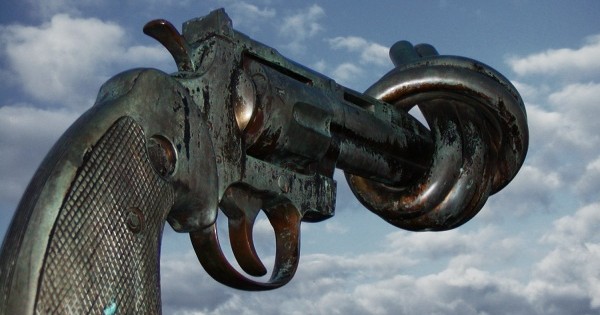Getting Better All the Time
Although you wouldn't know it by watching the local news, humankind is becoming ever more civilized

The Better Angels of Our Nature: Why Violence Has Declined, by Steven Pinker, Viking, 832 pp., $40
In John Ford’s classic 1962 film, The Man Who Shot Liberty Valance, a clash of moral codes unfolds in the Wild West frontier town of Shinbone. Under the Cowboy Code, disputes are settled and justice is served between individuals who have taken the law into their own hands, and under the Law Code, disputes are settled and justice is served by institutions because most members of society have agreed to obey the rules. The Cowboy Code is represented by John Wayne’s character, Tom Doniphon, a gunslinger who enforces justice on his own terms through the power of his presence backed by the gun on his hip. The Law Code is embodied by Jimmy Stewart’s Ransom Stoddard, an attorney hell-bent on seeing his beloved Shinbone embrace the rule of law. Lee Marvin’s Liberty Valance is a coarse highwayman who respects only one man, Tom Doniphon, because they share the Cowboy Code. Despite Valance’s constant flouting of the law, Stoddard holds to his belief that until Valance is caught doing something illegal there can be no justice. When Doniphon tells Stoddard, “You better start packin’ a handgun,” Stoddard rejoins, “I don’t want to kill him. I just want to put him in jail.” At long last, however, Stoddard takes Doniphon’s advice that “out here a man settles his own problems” and turns to him for gunfighting lessons. When Valance challenges Stoddard to a duel, the overconfident naïf accepts and a late-night showdown ensues. In a darkened street, the two men square off. Stoddard trembles while Valance mocks and scorns him, shooting first too high and then too low. When Valance takes aim to kill, Stoddard shakily draws his weapon and discharges it. Valance collapses in a heap. Having felled one of the toughest guns in the West, Stoddard goes on to become a local hero, building that image into political capital and working his way up from local politics to a distinguished career as a U. S. senator.
So it would appear that the Law Code prevailed over the Cowboy Code, but not so fast. In a flashback replay of the duel from another perspective, we see Doniphon, who knows that Stoddard is no match for Valance, lurking in the shadows and fingering a rifle. At the crucial moment, he shoots Valance. Holding to the Cowboy Code of loyalty, Doniphon takes the secret to his grave.
The transition from the informal rule of frontier justice found in premodern societies to the formal rule of law pervasive throughout today’s democratic nations resulted from the creation of political and economic systems and legal and moral codes that together have led to a decline in violence. Harvard psychologist and public intellectual Steven Pinker, in his latest book, The Better Angels of Our Nature, calls this “the civilizing process.” The title comes from Abraham Lincoln’s first Inaugural Address, delivered as America was about to fall into an anything-but-civil civil war. Four years and 600,000 dead later, our better angels finally emerged. Or did they? What about two world wars, the Holocaust, Stalin’s purges, Mao’s Cultural Revolution, Cambodia’s killing fields, and the numerous genocides in Africa? How can anyone seriously argue that there has been a decline in violence? Pinker demonstrates that long-term data trumps anecdotes. The idea that we live in an exceptionally violent time is an illusion created by the media’s relentless coverage of violence, coupled with our brain’s evolved propensity to notice and remember recent and emotionally salient events. Pinker’s thesis is that violence of all kinds—from murder, rape, and genocide to the spanking of children to the mistreatment of blacks, women, gays, and animals—has been in decline for centuries as a result of the civilizing process.
[adblock-left-01]
Picking up Pinker’s 832-page opus feels daunting, but it’s a page-turner from the start as he reminds us through literary examples what life was once like. Homer’s Agamemnon explains to King Menelaus his war strategy: “We are not going to leave a single one of them alive, down to the babies in their mothers’ wombs—not even they must live. The whole people must be wiped out of existence, and none be left to think of them and shed a tear.” The Bible, Pinker reminds us, “depicts a world that, seen through modern eyes, is staggering in its savagery. People enslave, rape, and murder members of their immediate families. Warlords slaughter civilians indiscriminately, including the children. Women are bought, sold, and plundered like sex toys. And Yahweh tortures and massacres people by the hundreds of thousands for trivial disobedience or for no reason at all.” In fact, Pinker cites the Bible’s first murder: Abel’s of Cain. “With a world population of exactly four,” Pinker notes, “that works out to a homicide rate of 25 percent, which is about a thousand times higher than the equivalent rates in Western countries today.”
Pinker is not being flippant. A graph presents the data from dozens of studies charting the percentage of war deaths from prehistoric times to the present. The contrast is striking: prehistoric peoples and modern hunter-gatherers and hunter-agriculturalists are far more murderous than nation-states, with war deaths per year reaching as high as 60 percent of the total population compared with five percent or less for the latter. Even 20th-century wars weren’t so bloody by comparison: about 40 million people died in battle during a century in which around six billion people died, which amounts to 0.7 percent battle deaths. What about noncombat deaths, the “collateral damage” of war? “Even if we tripled or quadrupled the estimate to include indirect deaths from war-caused famine and disease, it would barely narrow the gap between state and nonstate societies,” Pinker writes. What about all those genocides and the Holocaust? That brings the death toll up to 180 million deaths, which “still amounts to only 3 percent of the deaths in the 20th century.” What about the 21st century? In 2005, Pinker computes that 0.008 percent of Americans died in two foreign wars and domestic homicides combined. In the world as a whole, the rate of violence from war, terrorism, genocide, and killings by warlords and militias was 0.0003 percent of the total population.
 The numbers go on and on like this for hundreds of pages, punctuated by poignant anecdotes driving home the point that things really are getting better, that these are the good old days. Readers of this book, Pinker reminds us, “no longer have to worry about abduction into sexual slavery, divinely commanded genocide, lethal circuses and tournaments, punishments on the cross, rack, wheel, stake, or strappado for holding unpopular beliefs, decapitation for not bearing a son, disembowelment for having dated a royal, pistol duels to defend their honor, beachside fisticuffs to impress their girlfriends, and the prospect of a nuclear world war that would put an end to civilization or to human life itself.” You can, of course, think of exceptions here and there, but that’s the point: what used to be commonplace is now rare, and in most of the above examples, nonexistent. Why?
The numbers go on and on like this for hundreds of pages, punctuated by poignant anecdotes driving home the point that things really are getting better, that these are the good old days. Readers of this book, Pinker reminds us, “no longer have to worry about abduction into sexual slavery, divinely commanded genocide, lethal circuses and tournaments, punishments on the cross, rack, wheel, stake, or strappado for holding unpopular beliefs, decapitation for not bearing a son, disembowelment for having dated a royal, pistol duels to defend their honor, beachside fisticuffs to impress their girlfriends, and the prospect of a nuclear world war that would put an end to civilization or to human life itself.” You can, of course, think of exceptions here and there, but that’s the point: what used to be commonplace is now rare, and in most of the above examples, nonexistent. Why?
Pinker’s theory is that the better angels of our nature are brought out by the civilizing process of two forces: the top-down rule of law and the bottom-up rule of morals. He grounds his theory in historian Norbert Elias’s 1939 book, The Civilizing Process, a catalog of examples from the archives of history demonstrating that over the centuries, “beginning in the 11th or 12th and maturing in the 17th and 18th, Europeans increasingly inhibited their impulses, anticipated the long-term consequences of their actions, and took other people’s thoughts and feelings into consideration. A culture of honor—the readiness to take revenge—gave way to a culture of dignity—the readiness to control one’s emotions. These ideals originated in explicit instructions that cultural arbiters gave to aristocrats and noblemen, allowing them to differentiate themselves from the villains and boors. But they were then absorbed into the socialization of younger and younger children until they became second nature.”
Second nature. Our first nature is to be selfish, greedy, and nasty. Our second nature—those better angels of our nature—requires a little coaxing and persuading to come out. Analysis of medieval books of etiquette, for example, reveals that the numerous prohibitions are reducible to a few principles related to this second nature, as Pinker notes: “Control your appetites; Delay gratification; Consider the sensibilities of others; Don’t act like a peasant; Distance yourself from your animal nature. And the penalty for these infractions was assumed to be internal: a sense of shame.” Externally, other forces were at work: “the centralization of state control and its monopolization of violence, the growth of craft guilds and bureaucracies, the replacement of barter with money, the development of technology, the enhancement of trade, the growing webs of dependency among far-flung individuals,” and the like.
Again—and it bears repeating—violence is on the decline, with occasional bumps along the way. Think of global warming. Yes, some years are cooler, but the overall trend is that of a warming Earth. The analogy applies to violence of all kinds. Compared with 500 or 1,000 years ago, a greater percentage of people in more places more of the time are safer, healthier, wealthier, and freer today. If recent political events make you believe that things are grim and getting worse, take heart from Pinker, who notes that “in every issue touched by the Rights Revolutions—interracial marriage, the empowerment of women, the tolerance of homosexuality, the punishment of children, and the treatment of animals,” those better angels are on the ascent.


